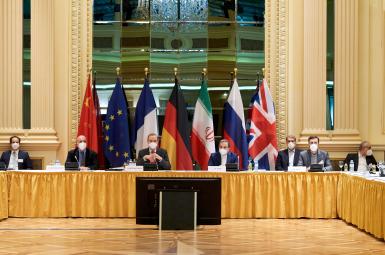
EXCLUSIVE - US Sanctions On Khamenei Muddy Iran Nuclear Talks
Two diplomats connected with talks in Vienna over reviving Iran’s 2015 nuclear deal with world powers have told Iran International that United States sanctioning of Supreme Leader Ali Khamenei and his office is currently a sticking point.
Former president Donald Trump in June 2019 issued Executive Order 13876 sanctioning Khamenei and his office and empowering the US administration to designate others associated with the leader or his office. Among the individuals subsequently listed by US officials under this EO was Iran’s Foreign Minister Mohammad Javad Zarif in June 2019, and in November 2019 Chief Justice Ebrahim Raisi (Raeesi), who on Friday was elected president.
One non-European diplomat told Iran International's Niloofar Pourebrahim in Vienna that the Iranian delegation in Vienna is convinced sanctions on Khamenei and his office will be lifted as part of agreement on reviving the 2015 deal, the JCPOA (Joint Comprehensive Plan of Action). A European diplomat said the US realized agreement would “unavoidably” mean scrapping these sanctions.
The Vienna talks, underway since early April, are concentrated on which US sanctions would be removed, and which steps in Iran’s nuclear program reversed or adapted, for the JCPOA to be back in place. Former US president Donald Trump withdrew the US from the deal in 2018 before imposing stringent sanctions on Iran, prompting it from 2019 to boost its nuclear program beyond JCPOA limits.
Arguing Over A Text
The European diplomat said that the leader and his office was one of many aspects of sanctions being discussed for the text of a document on JCPOA revival. Iran, the diplomat said, was pressing for simply annulling the Trump executive order, which would automatically remove 128 individuals designated under it.
An alternative is that President Joe Biden could annul the executive order but continue to designate some of the individuals on grounds that this was consistent with lifting sanctions incompatible with the JCPOA, so called ‘nuclear sanctions.’ But Iran has consistently argued that the Trump administration made clear that its sanctions – while ostensibly on grounds of ‘human rights,’ or ‘terrorism’ – were designed to stymie any successor in restoring the JCPOA.
Iran also demands lifting of sanctions imposed on the Revolutionary Guard (IRGC), potentially a tall order given its reputation as an entity linked to terrorism. Ali Vaez the Iran Project Director at Crisis Group told Iran International, "Lifting IRGC sanctions will have a hefty cost for the Biden Adminsitration and it is not a consession Washington can easily afford."
Both the European and the non-European diplomat emphasized that while considerable progress had been made in the talks, this issue had not been resolved. Iran has also argued that the US should lift the ‘terrorist’ designation of its Revolutionary Guards (IRGC).
Best Laid Sanctions
But many critics of Biden in the US argue this is the best laid of Trump sanctions designed to thwart JCPOA revival. And while Trump designated the IRGC as a ‘foreign terrorist organization’ in 2017, the first time Washington applied the label to the armed forces of another state, the IRGC is subject to other sanctions going back to 1984. Tehran argues that all such designations impede its “access in areas of trade, technology, finance and energy” as required by the JCPOA.
Iran International understands that negotiators have been working on a five-part document in Vienna. The first part, a general political preface, would be followed by three annexes dealing with sanctions, the different aspects of Iran’s nuclear program, and a timetable for sequencing the return of the US and Iran to JCPOA commitments as detailed in the first two annexes. A fifth section would be a statement where the foreign ministers of “JCPOA members” – it is unclear if this would include the US – would reaffirm their commitment to the agreement.
Messages Flying Round
Another remaining issue lies with US and European efforts to have a reference in the document to some commitment to working for what the Americans call “a longer, stronger agreement.” The European diplomat said Moscow was close to the US and European position, although it is unclear whether this refers to extending the JCPOA timeframe or to a wider regional agreement on defense and security. None of these parties, including the Biden administration, has made JCPOA revival conditional on any other agreement.
Contradictory messages and claims have been flying around as to whether an agreement in Vienna is likely before Raisi takes office in August.
The US news website Friday Axios reported a US official claiming that the Biden administration wanted to settle matters first, and one source in Vienna told MP, Iran International, that the Americans believe that there would be no hope for success in reviving the JCPOA once Riasi takes over.
But Rafael Mariano Grossi, head of the United Nations International Atomic Energy Agency, told Repubblica newspaper this week he believed there would be no agreement before Raisi took over. After meeting Zarif in Ankara Friday in Antalya, Turkey, to discuss the JCPOA, Josep Borell Fontelles, the European Union foreign policy chief, sent a tweet welcoming “progress over last weeks” with difficult decisions” remaining, and called “in view of today's Presidential elections…for continued commitment by Iran.”





